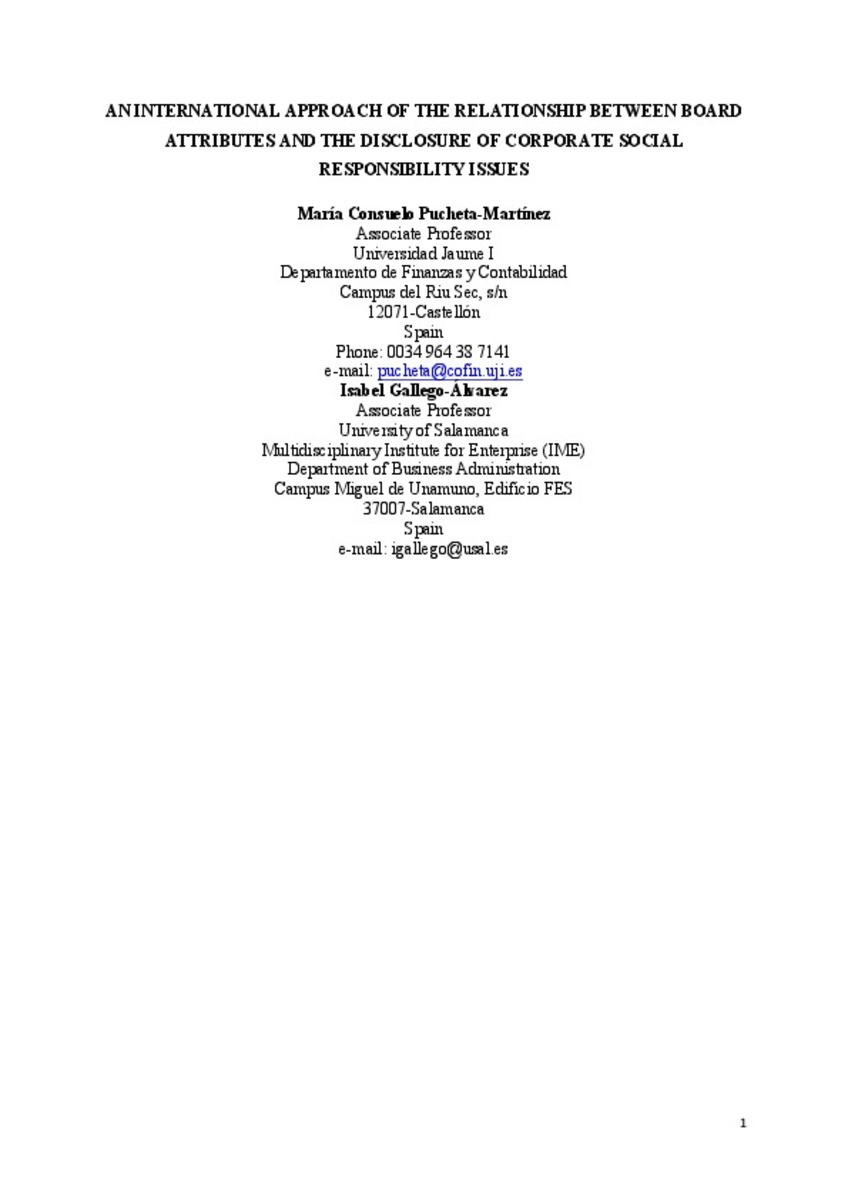Mostrar el registro sencillo del ítem
An international approach of the relationship between board attributes and the disclosure of corporate social responsibility issues
| dc.contributor.author | Pucheta-Martínez, María Consuelo | |
| dc.contributor.author | Gallego-Alvarez, Isabel | |
| dc.date.accessioned | 2019-04-04T06:59:54Z | |
| dc.date.available | 2019-04-04T06:59:54Z | |
| dc.date.issued | 2018 | |
| dc.identifier.citation | PUCHETA‐MARTÍNEZ, María Consuelo; GALLEGO‐ÁLVAREZ, Isabel. An international approach of the relationship between board attributes and the disclosure of corporate social responsibility issues. Corporate Social Responsibility and Environmental Management, 2018 | ca_CA |
| dc.identifier.issn | 1535-3958 | |
| dc.identifier.issn | 1535-3966 | |
| dc.identifier.uri | http://hdl.handle.net/10234/182191 | |
| dc.description | This is the pre-peer reviewed version of the following article: An international approach of the relationship between board attributes and the disclosure of corporate social responsibility issues. Corporate Social Responsibility and Environmental Management (2018), which has been published in final form at https://doi.org/10.1002/csr.1707. This article may be used for non-commercial purposes in accordance with Wiley Terms and Conditions for Use of Self-Archived Versions. | |
| dc.description.abstract | Firms interested in being perceived by all stakeholders and society as drivers of corporate social responsibility (CSR) activities, especially regarding CSR reporting, should have boards of directors that defend not only shareholder interests but also all stakeholders' needs. Thus, we expect that efficient boards, particularly if well‐structured, will impact on CSR disclosure. As a result, in this paper, we examine the effect of board composition, particularly board size, board independence, board gender diversity, chief executive officer (CEO) duality, and CSR board committee, on CSR reporting. Using a sample of international firms, concretely 13,178 observations belonging to 39 countries, we hypothesize that all these attributes positively affect CSR disclosure, except board independence and CEO duality, which are expected to impact negatively. These hypotheses are theoretically supported by the agency and stakeholder perspectives. Our findings support all the hypotheses, except that of CEO duality, and therefore, we conclude that board characteristics such as board size, board gender diversity, and CSR board committees encourage the disclosure of CSR matters, whereas board independence discourages this reporting. Contrary to our predictions, CEO duality has a positive effect on CSR reporting. | ca_CA |
| dc.format.extent | 16 p. | ca_CA |
| dc.format.mimetype | application/pdf | ca_CA |
| dc.language.iso | eng | ca_CA |
| dc.publisher | Wiley | ca_CA |
| dc.relation.isPartOf | Corporate Social Responsibility and Environmental Management, 2018 | ca_CA |
| dc.rights | Copyright © John Wiley & Sons, Inc. | ca_CA |
| dc.rights.uri | http://rightsstatements.org/vocab/InC/1.0/ | * |
| dc.subject | board gender diversity | ca_CA |
| dc.subject | board independence | ca_CA |
| dc.subject | board size | ca_CA |
| dc.subject | CEO duality | ca_CA |
| dc.subject | CSR board committee | ca_CA |
| dc.subject | CSR reporting | ca_CA |
| dc.subject | international perspective | ca_CA |
| dc.title | An international approach of the relationship between board attributes and the disclosure of corporate social responsibility issues | ca_CA |
| dc.type | info:eu-repo/semantics/article | ca_CA |
| dc.identifier.doi | https://doi.org/10.1002/csr.1707 | |
| dc.relation.projectID | The Ministry of Economy, Industry and Competitiveness: Grant Number: ECO 2017‐82259‐R; The University Jaume I, Spain: Grant Number: UJI‐B2018‐15 | ca_CA |
| dc.rights.accessRights | info:eu-repo/semantics/openAccess | ca_CA |
| dc.relation.publisherVersion | https://onlinelibrary.wiley.com/doi/full/10.1002/csr.1707 | ca_CA |
| dc.type.version | info:eu-repo/semantics/submittedVersion | ca_CA |
Ficheros en el ítem
Este ítem aparece en la(s) siguiente(s) colección(ones)
-
COFIN_Articles [215]








